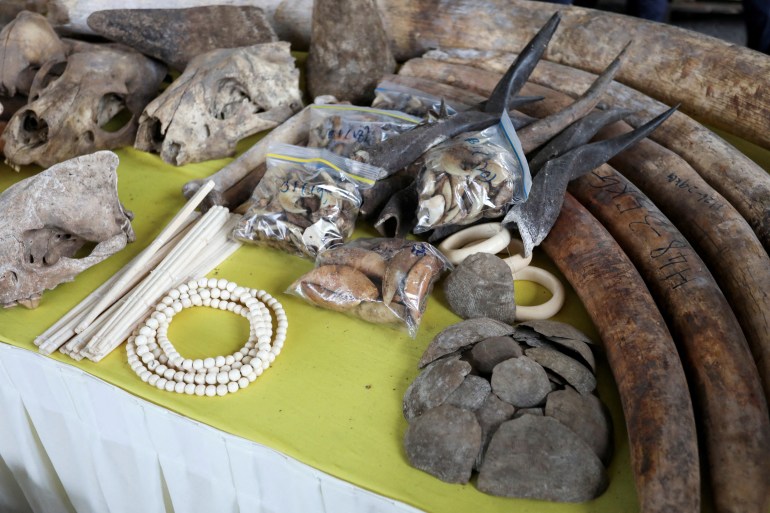Malaysia seizes elephant tusks, pangolin scales in major bust
Officials say that the $18m seizure of tusks, skulls, horns and scales is their biggest to date.
Malaysian authorities have seized a container of African elephant tusks, pangolin scales and other wildlife skulls and bones estimated to be worth 80 million Malaysian ringgit ($18m) – their biggest seizure to date.
The Royal Malaysian Customs Department said in a statement on Monday that it had discovered the contraband hidden behind sawn timber following checks on a ship on July 10.
The haul included 6,000kg (13,227 pounds) of elephant tusks, 100kg (220 pounds) of pangolin scales, 25kg (55 pounds) of rhino horns and 300kg (661 pounds) of animal parts including bones and horns, it added.
Royal Malaysian Customs Director General, Zazuli Johan, told reporters at a news conference in Port Klang, Malaysia’s main port, that it was their biggest seizure to date.
The shipment had been on its way from Africa via Abu Dhabi to Pasir Gudang, a major port in southern Malaysia, and was under surveillance.
He said: “The customs enforcement unit successfully thwarted an attempted smuggling of these items – elephant tusks, rhino horns, pangolin scales, tiger teeth and various other bones and animal parts that were found in a container at Port Klang.”
The customs department said investigations were ongoing.

Officials did not give further details and it was unclear if the container was meant to be shipped to other parts of Asia.
“This medley of threatened species in a single consignment is concerning,” Kanitha Krishnasamy, director for TRAFFIC Southeast Asia, said in a statement. “It certainly verifies the suspicion that criminals continue to use Malaysian ports to move contraband wildlife.”
Trade in the world’s eight species of the pangolin is completely banned under the Convention on International Trade in Endangered Species (CITES).
Still, demand for the animal’s scales, which, like human nails, are made of keratin, is feeding the illegal trade. The pangolin is said to be the world’s most trafficked mammal.
Ivory tusks, rhino horns and pangolin scales are believed to have medicinal properties by some people, and are in high demand in the region.




